Darwins Revolution
- 格式:pdf
- 大小:22.92 KB
- 文档页数:3

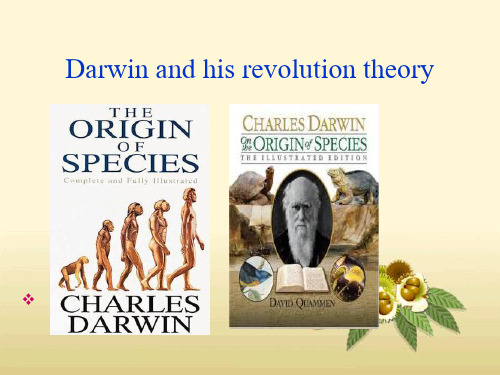
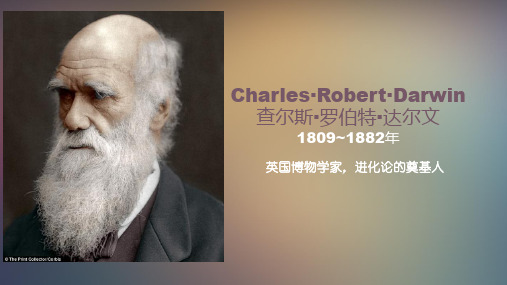

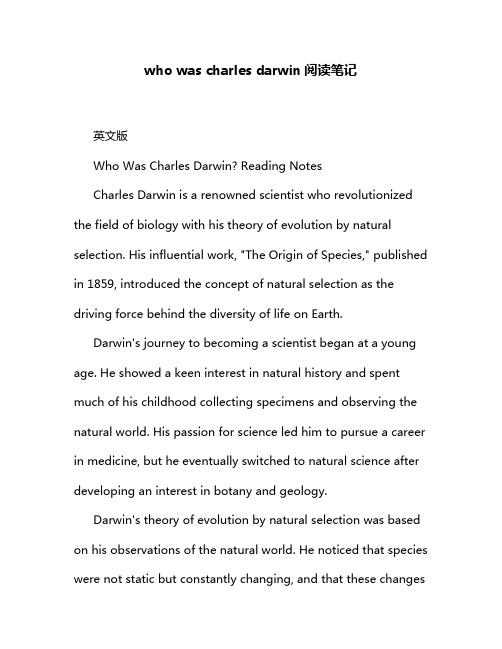
who was charles darwin阅读笔记英文版Who Was Charles Darwin? Reading NotesCharles Darwin is a renowned scientist who revolutionized the field of biology with his theory of evolution by natural selection. His influential work, "The Origin of Species," published in 1859, introduced the concept of natural selection as the driving force behind the diversity of life on Earth.Darwin's journey to becoming a scientist began at a young age. He showed a keen interest in natural history and spent much of his childhood collecting specimens and observing the natural world. His passion for science led him to pursue a career in medicine, but he eventually switched to natural science after developing an interest in botany and geology.Darwin's theory of evolution by natural selection was based on his observations of the natural world. He noticed that species were not static but constantly changing, and that these changeswere adaptive and resulted in better survival and reproduction. Darwin proposed that species evolved over time through the process of natural selection, whereby individuals with more favorable traits were more likely to survive and pass their genes to the next generation.Darwin's theory was groundbreaking at the time and faced significant opposition from religious and scientific communities. However, his ideas gradually gained acceptance and are now widely accepted as the foundation of modern evolutionary theory.Reading about Charles Darwin's life and work has been an eye-opening experience. His dedication to science and his courage to challenge conventional wisdom have left a lasting impact on the field of biology. His theory of evolution by natural selection has not only explained the diversity of life on Earth but has also provided a framework for understanding the origins and development of all species.中文版查尔斯·达尔文是谁?阅读笔记查尔斯·达尔文是一位杰出的科学家,他的自然选择进化论彻底改变了生物学领域。




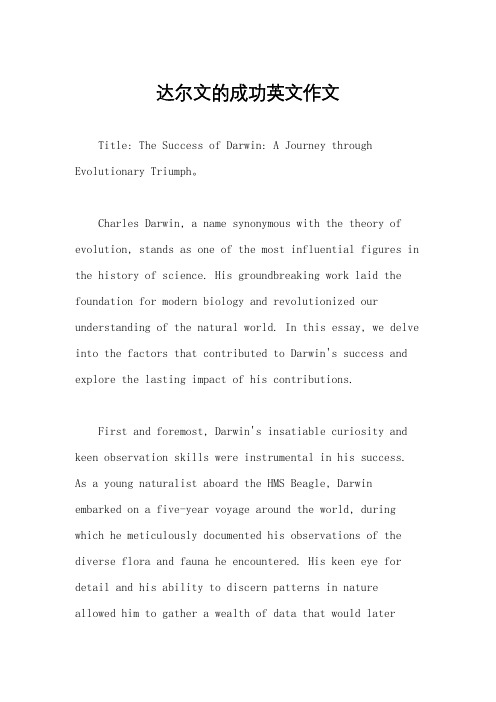
达尔文的成功英文作文Title: The Success of Darwin: A Journey through Evolutionary Triumph。
Charles Darwin, a name synonymous with the theory of evolution, stands as one of the most influential figures in the history of science. His groundbreaking work laid the foundation for modern biology and revolutionized our understanding of the natural world. In this essay, we delve into the factors that contributed to Darwin's success and explore the lasting impact of his contributions.First and foremost, Darwin's insatiable curiosity and keen observation skills were instrumental in his success. As a young naturalist aboard the HMS Beagle, Darwin embarked on a five-year voyage around the world, during which he meticulously documented his observations of the diverse flora and fauna he encountered. His keen eye for detail and his ability to discern patterns in nature allowed him to gather a wealth of data that would laterform the basis of his theories.Furthermore, Darwin's willingness to challenge prevailing dogma and question established beliefs was crucial in shaping his revolutionary ideas. In an era dominated by religious orthodoxy and the concept of divine creation, Darwin dared to propose a theory that posited a natural explanation for the diversity of life on Earth. Despite facing fierce opposition from religious and scientific communities alike, Darwin remained steadfast in his commitment to the truth and continued to refine his ideas based on empirical evidence.Another key factor in Darwin's success was his ability to communicate his ideas effectively. In his seminal work, "On the Origin of Species," Darwin presented a compelling argument for the theory of evolution through natural selection, marshaling evidence from diverse fields such as paleontology, embryology, and biogeography. His clear and concise writing style, coupled with his logical reasoning and persuasive arguments, helped to win over many skeptics and cement his place in scientific history.Moreover, Darwin's success can also be attributed to the collaborative nature of scientific inquiry. Throughout his career, Darwin corresponded with a network of fellow scientists and scholars, exchanging ideas, sharing data, and engaging in spirited debates. This collaborative approach not only enriched Darwin's own thinking but also facilitated the dissemination of his ideas to a wider audience, ensuring their lasting impact on the scientific community.Finally, Darwin's success can be measured by the enduring legacy of his ideas. More than a century after the publication of "On the Origin of Species," the theory of evolution remains the cornerstone of modern biology, providing a unifying framework for understanding the diversity of life on Earth. Darwin's emphasis on the importance of variation, adaptation, and natural selection continues to shape our understanding of how species evolve and interact with their environments.In conclusion, the success of Charles Darwin can beattributed to a combination of factors, including his curiosity, his willingness to challenge conventional wisdom, his effective communication skills, his collaborativespirit, and the enduring legacy of his ideas. By daring to question the status quo and pursuing his scientificinquiries with rigor and determination, Darwin forever changed the way we view the natural world and our place within it.。

英语达尔文读后感After reading "The Origin of Species" by Charles Darwin, I was captivated by the depth and significance of his ideas. Darwin's groundbreaking work revolutionized our understanding of the natural world and continues to shape the field of biology to this day.Darwin's central concept, natural selection, is a powerful and elegant explanation for the diversity of life on Earth. He observed that individuals within a species vary in their traits, and those with advantageous traits are more likely to survive and reproduce. Over time, this leads to the accumulation of beneficial traits in a population, resulting in the evolution of new species. This idea challenged the prevailing belief in the fixity of species and provided a mechanism for how life could adapt and change over time.One of the most compelling aspects of Darwin's theory is its ability to explain the intricate adaptations found in organisms. From the long neck of a giraffe to the camouflage of a chameleon, natural selection offers a compelling explanation for the diversity and complexity of life. By favoring traits that enhance an organism's survival and reproductive success, nature acts as a selective force, shaping the characteristics of species over generations.Moreover, Darwin's theory provides a framework for understanding the unity of life. By proposing that all species share a common ancestor, he established a unifying principle that connects every living organism on Earth. This concept has profound implications for our understanding of our place in the natural world and our relationship with other species.Darwin's work also sheds light on the processes that have shaped the Earth's biodiversity over millions of years. Through his observations of the Galapagos Islands, he discovered that different islands had distinct species of finches, each adapted to their specific environments. This led him to propose that geographic isolation and subsequent adaptation were driving forces behind the formation of new species. This concept, known as speciation, provides a mechanism for how new species arise and diversify.Furthermore, Darwin's theory of evolution has far-reaching implications beyond the realm of biology. It has profound implications for our understanding of human nature, our place in the natural world, and even our own origins. By recognizing our shared ancestry with other species, we are compelled to consider the ethical implications of our actions towards the environment and the preservation of biodiversity.In conclusion, Charles Darwin's "The Origin of Species" is a seminal work that has forever changed our understanding of the natural world. His theory of evolution through natural selection provides a powerful explanation for the diversity, complexity, and unity of life on Earth. By challenging the prevailing beliefs of his time, Darwin revolutionized the field of biology and laid the foundation for modern evolutionary theory. His ideas continue to inspire and shape scientific inquiry, reminding us of the interconnectedness of all living organisms and the importance of preserving the natural world.。

达尔文的贡献英文作文Darwin's contribution to the field of biology is immense. His theory of evolution through natural selection revolutionized our understanding of the natural world. By observing the diversity of species and their adaptations to different environments, Darwin was able to propose a mechanism for how new species arise and how they change over time.Darwin's work also had a profound impact on our understanding of human origins. His theory of common descent suggests that all living organisms, including humans, share a common ancestor. This idea challenged traditional religious beliefs about the origins of life and sparked intense debate within both the scientific and religious communities.In addition to his theoretical contributions, Darwin also conducted extensive research and fieldwork to support his ideas. His famous voyage on the HMS Beagle allowed himto collect a wealth of data on the natural world, which he used to develop and refine his theory of evolution. This empirical approach to science set a new standard for biological research and laid the foundation for modern evolutionary biology.Darwin's influence extends beyond the field of biology. His ideas have had a profound impact on fields as diverse as anthropology, psychology, and even philosophy. The concept of natural selection has been used to explain not only the diversity of life on Earth, but also human behavior and cultural development.Despite the controversy and opposition he faced during his lifetime, Darwin's work has stood the test of time. His theory of evolution through natural selection remains the cornerstone of modern biology, and his contributions continue to shape our understanding of the natural world.。


darwinism的名词解释达尔文主义的名词解释达尔文主义是指科学家查尔斯·达尔文关于生物进化的理论和观点。
这一理论在19世纪中叶由达尔文提出并发展起来,对生物学、人类学和其他相关领域产生了深远的影响。
达尔文主义的核心概念是物种进化和适者生存,它提供了一种全面的解释来理解生物多样性以及物种如何适应环境并发展演化。
1. 达尔文主义的起源达尔文主义的起源可以追溯到查尔斯·达尔文的《物种起源》一书的出版。
1859年,达尔文首次公开阐述了他的进化理论,并提出了自然选择的概念。
他认为,物种的变异在适应环境中会得到保留和积累,这导致了物种的逐渐变化和演化。
他的观点引起了巨大的争议和反对,但后来经过了大量的研究和证据支持,达尔文主义逐渐成为现代生物学的基石之一。
2. 自然选择的关键概念达尔文主义的核心概念是自然选择。
在自然界中,某些个体适应环境的能力更强,能够生存并繁衍后代,而其他个体则可能会被淘汰。
这种适应性更高的个体会将其有利的特征传递给下一代,从而导致物种逐渐改变和进化。
这种过程使得物种能够适应不断变化的环境条件,并增加其存活和繁衍的机会。
自然选择被视为生物进化的主要驱动力。
3. 适应性和多样性达尔文主义认为,适应性是物种生存和繁衍的关键。
适应性更强的个体能够更好地利用环境资源,抵抗疾病和捕食者的袭击,并更好地繁衍后代。
然而,环境条件的改变可能会导致原先适应性较高的特征变得不再适应。
这就需要物种通过变异和选择来适应新的环境压力,从而保持其生存和繁衍的能力。
另一方面,达尔文主义也强调了生物多样性的重要性。
不同的环境中存在着各种不同的生物和物种,它们通过自然选择的过程逐渐适应和演化。
这种多样性使得地球上的生态系统更加稳定和复杂,增加了整个生物圈的生存能力。
4. 进化的证据和支持达尔文主义的理论得到了大量的实证支持。
化石记录显示了过去物种的变化和演化,从中我们可以观察到不同物种之间的共同祖先和演化关系。
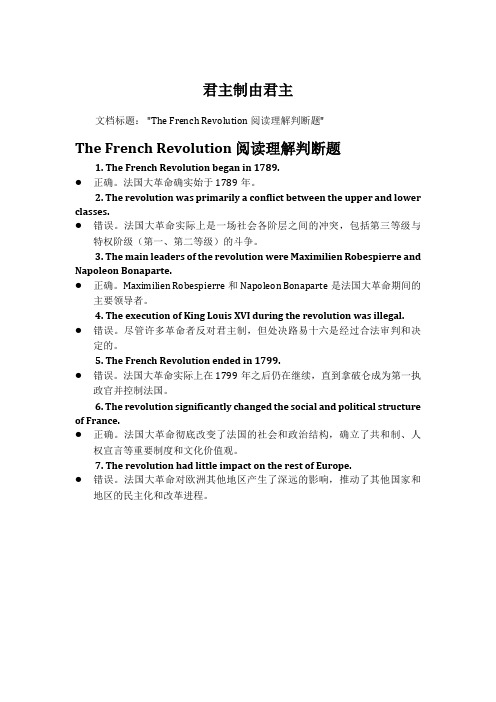
君主制由君主文档标题: "The French Revolution 阅读理解判断题"The French Revolution 阅读理解判断题1. The French Revolution began in 1789.●正确。
法国大革命确实始于1789年。
2. The revolution was primarily a conflict between the upper and lower classes.●错误。
法国大革命实际上是一场社会各阶层之间的冲突,包括第三等级与特权阶级(第一、第二等级)的斗争。
3. The main leaders of the revolution were Maximilien Robespierre and Napoleon Bonaparte.●正确。
Maximilien Robespierre和Napoleon Bonaparte是法国大革命期间的主要领导者。
4. The execution of King Louis XVI during the revolution was illegal.●错误。
尽管许多革命者反对君主制,但处决路易十六是经过合法审判和决定的。
5. The French Revolution ended in 1799.●错误。
法国大革命实际上在1799年之后仍在继续,直到拿破仑成为第一执政官并控制法国。
6. The revolution significantly changed the social and political structure of France.●正确。
法国大革命彻底改变了法国的社会和政治结构,确立了共和制、人权宣言等重要制度和文化价值观。
7. The revolution had little impact on the rest of Europe.●错误。
法国大革命对欧洲其他地区产生了深远的影响,推动了其他国家和地区的民主化和改革进程。
Deutsch lernen und unterrichten – ArbeitsmaterialienTop-Thema mit VokabelnDarwins RevolutionSein ganzes Leben lang befasste sich Charles Darwin mit der Natur. Seine Evoluti-onstheorie stellte schließlich die Wissenschaften auf den Kopf. Darwins Erkennt-nisse sind heute noch von großer Bedeutung.Charles Darwin wurde am 12. Februar 1809 in England geboren. Er studierte Medizin und Theologie, aber am meisten interessierte er sich für die Jagd und das Reiten. Er unter-suchte mit Begeisterung Tiere und war am liebsten in der Natur. 1831 bekam er die Chance, mit dem Forschungsschiff "HMS Beagle" zu reisen. Insgesamt fünf Jahre war Darwin unterwegs und besuchte verschiedene Kontinente.Auf seiner Reise sammelte Darwin getrocknete Pflanzen, Fossilien, Insekten und Vögel. Zurück in London untersuchte er vor allem die Finken, die er auf den Galapagos-Inseln gefunden hatte. Viele von ihnen hatten einen kurzen dicken Schnabel. Damit knackten sie Nüsse und Samen. Andere hatten einen langen dünnen Schnabel, mit dem sie in Blü-ten und schmale Ritzen hineinkamen. Darwin erkannte, dass diese Finken gemeinsame Vorfahren haben mussten, aus denen sich mit der Zeit unterschiedliche Arten entwickelt hatten. Die Evolutionstheorie war geboren. Es folgten viele Jahre, in denen Darwin weiter-forschte.Als er sein Buch "Die Entstehung der Arten durch natürliche Auslese" 1859 veröffentlich-te, waren die Reaktionen sehr unterschiedlich: Lob und Begeisterung, aber auch Kritik und Empörung, vor allem bei der Kirche. Denn die biblische Schöpfungslehre besagt: Gott hat sämtliche Lebewesen – Mensch, Tiere und Pflanzen – innerhalb von sechs Tagen so erschaffen, wie sie heute aussehen. Darwin wurde als Atheist beschimpft, weil er sagte, dass alle Lebewesen sich stetig verändern und dass sie miteinander verwandt sind. Heute sind Darwins Erkenntnisse über die Entstehung der Tiere und der Menschen weit-gehend bestätigt, zum Beispiel auch seine Vermutung, dass der erste Mensch aus Afrika stammt. Er selbst verteidigte seine Thesen nie öffentlich, schrieb aber bis zu seinem Tod noch viele Bücher. Der Wissenschaftler starb am 19. April 1882 im Alter von 73 Jahren. Ihr Deutsch ist unser Auftrag!Deutsch lernen und unterrichten – ArbeitsmaterialienTop-Thema mit VokabelnGlossarEvolutionstheorie, die – die Idee von der Entwicklung der Lebewesenetwas auf den Kopf stellen – etwas stark verändernTheologie, die – die Lehre einer ReligionBegeisterung, die – die Freude; der SpaßFossil, das – sehr alte zu Stein gewordene TierskeletteFink, der – ein kleiner bunter VogelSchnabel, der – der Mund der Vögeletwas knacken – hier: öffnenSamen, der – das Korn einer Pflanze, aus dem eine neue Pflanze wachsen kann Ritze, die – ein längliches LochVorfahre, der – die Großeltern, deren Eltern und so weiternatürliche Auslese, die – die Tatsache, dass in der Natur die Lebewesen sterben, die nicht gut an ihre Umwelt angepasst sindEmpörung, die – die starke Wut; das Beleidigtseinbiblisch – bezogen auf die BibelSchöpfungslehre, die – die Lehre, wie das Leben durch einen Gott entstanden ist Atheist, der – jemand, der nicht an einen oder mehrere Götter glaubtstetig – immer, andauerndThese, die – die Idee; die VermutungIhr Deutsch ist unser Auftrag!Deutsch lernen und unterrichten – ArbeitsmaterialienTop-Thema mit VokabelnFragen zum Text1. Charles Darwin schrieb ein Buch über die Evolution, weil er …a) nicht an Gott glaubte.b) durch seine Forschung Beweise für sie gefunden hatte.c) er nicht an Finken interessiert war.2. Eine der Behauptungen der biblischen Schöpfungslehre ist, dass …a) der erste Mensch aus Afrika kamb) alle Lebewesen sich weiterentwickelnc) alle Lebewesen schon immer so waren, wie sie jetzt sind3. Das Buch, … Darwin seine Theorie erklärte, erschien 1859.a) wob) darinc) in dem4. Die Finken, … Schnäbel kurz und dick sind, können gut Nüsse knacken.a) derenb) dessenc) diese5. Das Schiff, … Darwin seine Forschungsreise unternahm, hieß "HMS Beagle".a) auf demb) wohinc) in dasArbeitsauftragJede Kultur hat ihre eigenen Geschichten über die Entstehung des Lebens und der Men-schen. Welche kennen Sie? Erzählen Sie im Kurs, welche Schöpfungsmythen es in Ihrem Heimatland gibt.Ihr Deutsch ist unser Auftrag!。